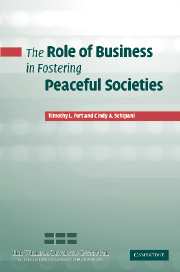Book contents
- Frontmatter
- Contents
- List of tables
- Acknowledgements
- Introduction
- Part I The plausibility of connecting business and peace
- Part II Current standards and their amenability to peace
- Part III Two illustrative issues: gender equality and ecology
- 5 Gender, voice, and correlations with peace
- 6 The ecological challenges of war: the natural environment and disease
- Conclusion
- Index
6 - The ecological challenges of war: the natural environment and disease
Published online by Cambridge University Press: 22 September 2009
- Frontmatter
- Contents
- List of tables
- Acknowledgements
- Introduction
- Part I The plausibility of connecting business and peace
- Part II Current standards and their amenability to peace
- Part III Two illustrative issues: gender equality and ecology
- 5 Gender, voice, and correlations with peace
- 6 The ecological challenges of war: the natural environment and disease
- Conclusion
- Index
Summary
“[E]nvironmental forces transcend borders and oceans to threaten directly the health, prosperity and jobs of American citizens. … [A]ddressing natural resource issues is frequently critical to achieving political and economic stability, and to pursuing our strategic goals around the world,” according to then US Secretary of State Warren Christopher, in the spring of 1996. “The next war in our region will be over the waters of the Nile, not politics,” observed Boutros Boutros-Ghali in 1988, then Egypt's Minister of State for Foreign Affairs. “Business is business, and capital, money, is a coward. It is drawn to places which have the rule of law, places where there is an accountability of government, educated healthy workforces, secure working conditions. Capital will flee – money will flee from corruption, bad policies. It will flee from conflict. It will flee from sickness,” according to US Secretary of State Colin Powell in fall of 2001.
From the pronouncements of these foreign policy leaders, it seems that businesspeople have a profound interest in a stable allocation of natural resources as well as an environment relatively free from violent conflict. The consequences of war involve the destruction of both human life and natural resources and directly impact business. For instance, in the conflict between East Timor and Indonesia that began in the mid-1970s, the Indonesian Air Force's use of napalm was not only a psychologically effective weapon against guerilla forces, it also destroyed forests, crops, and livestock, poisoned land and water, and started forest fires.
- Type
- Chapter
- Information
- The Role of Business in Fostering Peaceful Societies , pp. 183 - 222Publisher: Cambridge University PressPrint publication year: 2004

